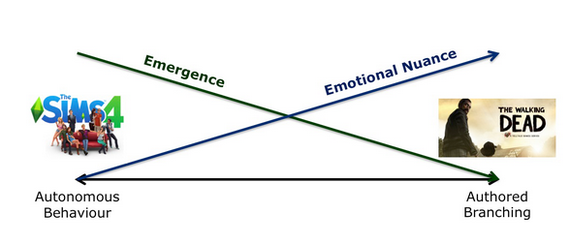http://www.theatlantic.com/technolo...o-games-are-better-without-characters/387556/ by Ian Bogost
i found this article pretty interesting in the way it combined industry history with social analysis and speculation about the influence that character-focused design has had on the general audience. the overwhelming preference for human characters and stories in big published games affecting the way players see games to the point where they strongly self-identify with them is a perspective i hadn't considered before and if true would shed new light on the heightened culture conflicts of the past year. as the author puts it:
in before people who only read the headline try to argue that bogost is advocating for doing away with all character driven interactive entertainment
Such was the payload of SimCity: not a game about people, even though its residents, the Sims, would later get their own spin-off. Nor is it a game about particular cities, for it is difficult to recreate one with the game's brittle, indirect tools. Rather, SimCity is a game about urban societies, about the relationship between land value, pollution, industry, taxation, growth, and other factors. It's not really a simulation, despite its name, nor is it an educational game. Nobody would want a SimCity expert running their town's urban planning office. But the game got us all to think about the relationships that make a city run, succeed, and decay, and in so doing to rise above our individual interests, even if only for a moment.
This was a radical way of thinking about video games: as non-fictions about complex systems bigger than ourselves. It changed games foreveror it could have, had players and developers not later abandoned modeling systems at all scales in favor of representing embodied, human identities.
i found this article pretty interesting in the way it combined industry history with social analysis and speculation about the influence that character-focused design has had on the general audience. the overwhelming preference for human characters and stories in big published games affecting the way players see games to the point where they strongly self-identify with them is a perspective i hadn't considered before and if true would shed new light on the heightened culture conflicts of the past year. as the author puts it:
But, an unpopular question lingers, one that Maxis's closure calls to mind. Why must we have characters in games at all? Or, more gently put, why have we assumed that the only or primary path to video-game diversity and sophistication lies in its representation of individuals as opposed to systems and circumstances? In truth, we've all but abandoned the work of systems and behaviors in favor of the work of individuals and feelings. And perhaps this is a grievous mistake.
Maybe the obsession with personal identification and representation in games is why identity politics has risen so forcefully and naively in their service online, while essentially failing to build upon prior theories and practices of social justice. And perhaps it is why some gamers have become so attached to their identity that they've been willing to burn down anything to defend it.
in before people who only read the headline try to argue that bogost is advocating for doing away with all character driven interactive entertainment

